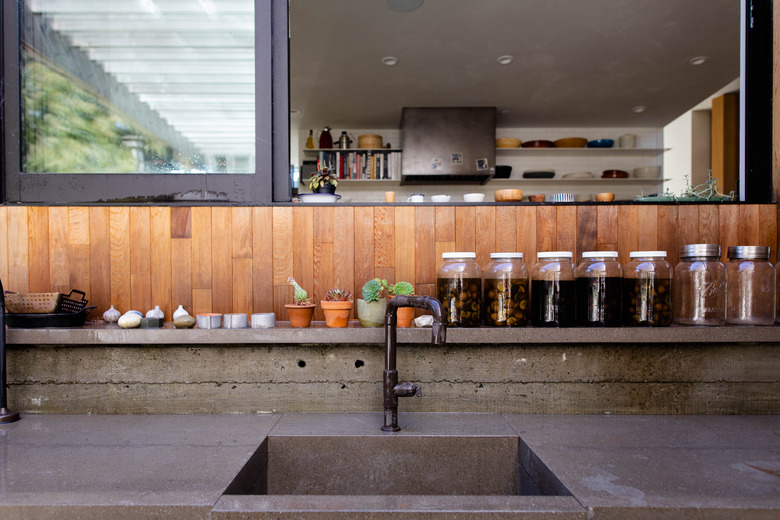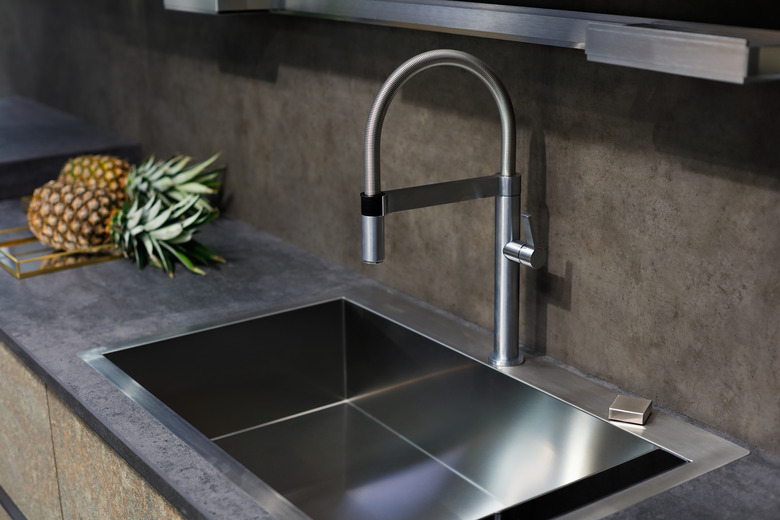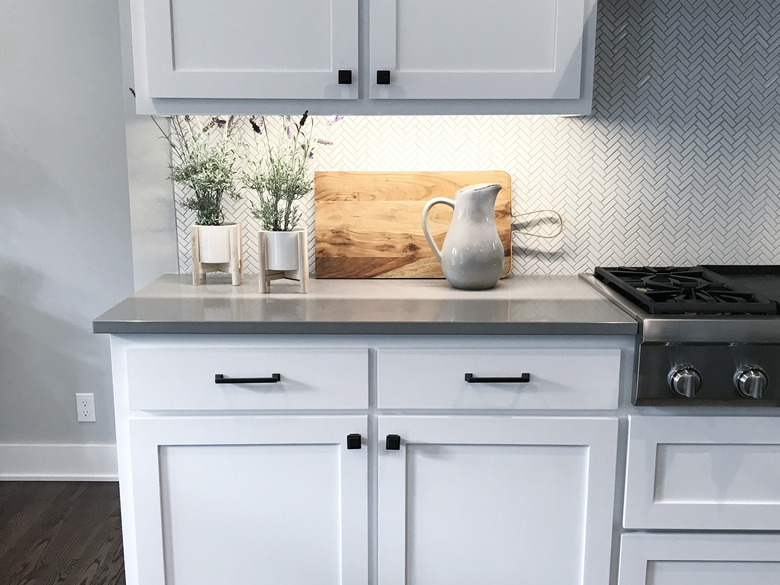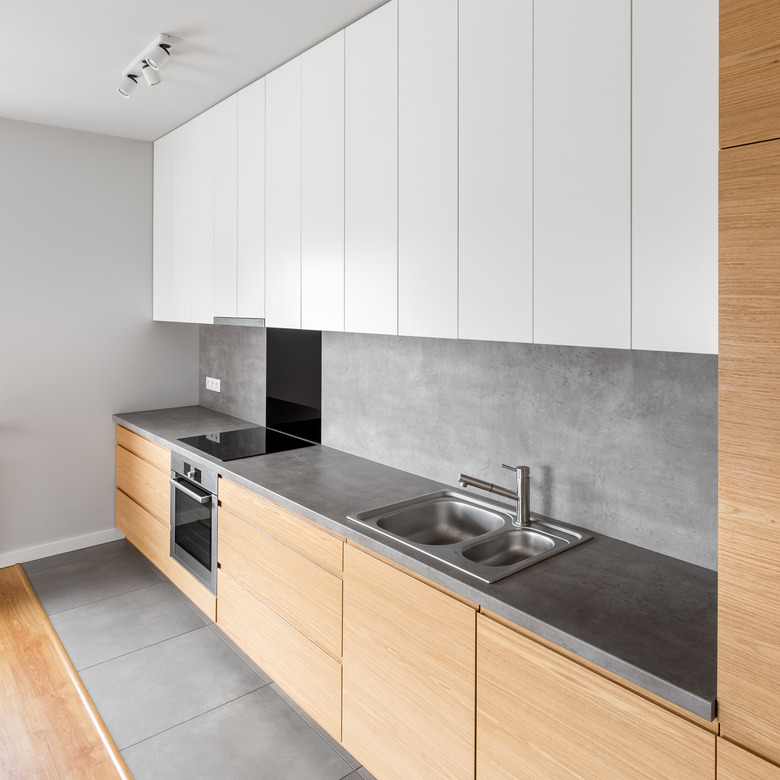How To Seal Concrete Countertops
Concrete countertops provide durable, long-lasting surfaces that can be designed to enhance the look and functionality of many kitchens. Like other concrete surfaces, concrete countertops do require that a sealer be applied, which will protect the surface from stains and potential damage from household cleaning solvents.
Sealing or resealing concrete countertops can be done as a DIY project, and finding the right sealer for your project is made easy by keeping just a few key criteria in mind. At around the same price as many types of natural stone and less expensive than marble, concrete countertops are available in a variety of looks that can add value to your home.
What Is Concrete Sealer?
What Is Concrete Sealer?
Concrete sealer is a product used to protect concrete surfaces from damage brought on by conditions like harsh weather and abrasion. In kitchens, it protects from chemicals, stains or simply general wear and tear. Unlike engineered, or composite-stone, countertops, concrete needs to be sealed in order to preserve the integrity of the material.
Because concrete is naturally porous, spilled food and liquids, even water, can easily penetrate unsealed concrete, which can lead to significant staining of your slab over time. Unsealed concrete in kitchen areas can become damaged not only by spilled food and liquids but also salt, oils and some household cleaners.
Concrete sealer can last anywhere from one year to over 10 years before it needs to be reapplied, depending on the type of sealer you've chosen for your project. To get added life out of your sealed counters, be sure to wipe up spills as quickly as possible so as not to let them dry and harden. Scrubbing too hard on a sealed concrete countertop may compromise the surface, especially if your countertops are nearly due for another resealing.
Finally, heat-resistant and scratch-resistant do not mean heatproof and scratchproof, so be sure to set hot pots and pans on a towel or silicone mat and don't cut food directly on your concrete countertop. Use a cutting board to preserve your investment.
Finding a Good Sealer
Finding a Good Sealer
So, what exactly makes a good concrete sealer for protecting kitchen counters? For starters, your sealer needs to be food safe, considering the location and for what the countertops will be used.
An acid-resistant sealer will also help to keep your concrete slab from staining or etching in the event that it ever comes in contact with certain foods or drinks, like lemon juice or wine, which are common concrete-staining culprits, according to Old House Journal. Additionally, a sealer that's heat- and scratch-resistant will not only work to protect your concrete countertops from potential damage but it will also last much longer between resealing treatments.
In addition to protecting your concrete countertops from damage, sealer will also work to keep your concrete looking great, with many allowing for the natural look of the material to shine through. Colorless sealers won't alter the look of your concrete countertops but will offer protection and, depending on the type of sealer, can provide a layer of shine or a matte finish.
Whatever type of sealer you choose, opt for a type that won't yellow over time, especially if your countertops will be exposed to high amounts of UV lights for long periods of time. As you will be applying your sealer indoors, look for brands formulated with little to no volatile organic compounds, which makes for safe application as well as a food-safe surface once dried.
Different Types of Sealers
Different Types of Sealers
There are a number of different types of concrete sealers, so finding one that will offer your concrete countertops everything they will need to withstand your lifestyle is important. The first thing to understand when shopping for sealers is that the sealers designed to protect concrete flooring are not the same as the sealers created for countertops, so search for sealers designed for indoor use that meet all of these criteria.
Popular sealers used for concrete countertops include epoxy sealer and polyurethane sealer, both of which are considered film-forming sealers for their ability to block the penetration of water into your concrete surface. Penetrating sealers, which seep below the surface of the concrete to seal the pores, and acrylic sealers are additional popular sealant types used by people for indoor projects.
- Acrylic: Acrylic sealer is offered in solvent- and water-based formulas that are available in a wide variety of finishes, have UV- and water-resistant properties, won't yellow over time and dry quickly. Acrylic sealer is commonly used for indoor projects, although it can be prone to scratching, especially if you opt for the water-based formula.
- Penetrating: Penetrating sealers are solvent-based sealers that offer protection from damage and won't compromise the look of a concrete slab, as they seep below the surface of the concrete to seal the pores. Because they do not coat the surface with a film, they can be a bit less effective at resisting stains than the other film-forming varieties.
- Polyurethane: Polyurethane sealer can be formulated as solvent- or water-based. Like acrylic, it is film-forming and twice as thick as acrylic sealer, which offers protection. However, it can look similar to plastic for this reason, which may not be ideal for some.
- Epoxy: Epoxy is one of the most attractive and durable sealers; however, it is sensitive to UV light along with heat and scratching. While sealing concrete countertops can usually be done as a DIY project, 100 percent epoxy and polyurethane sealers can be very thick and tough to work with, so it may be in your interest to enlist the help of a pro if application is difficult.
One more thing to keep in mind when searching for sealers is the application process. Some sealers are more thick and tacky than others and require more time to dry. Urethane and epoxy sealers like Ghostshield 880 and Z Aqua Poxy are thicker in consistency.
Acrylic sealers like CHENG Concrete Countertop Sealer, which is water-based, are a bit thinner and may be easier to handle when applying. Rollers are best for applying water-based sealants, pump sprayers work well with solvent-based sealers and airless sprayers are great for applying any sealant formula.
When to Apply Sealer
When to Apply Sealer
Depending on the type of sealer you'll be using, you will have to wait a certain amount of time before applying it to your new concrete countertops. For penetrating sealers like siliconates or silicates, you don't have to wait long at all to get to work — these sealers should be applied as soon as your newly installed concrete can support its own weight. With epoxy or urethane sealers, you should wait about 28 days before applying in order to allow enough time for your concrete slabs to cure properly.
How to Seal Concrete Countertops
How to Seal Concrete Countertops
Sealing your concrete countertops can be done easily, but it's important that the application process be carried out slowly and carefully in order to get the best and longest-lasting results. Some types of sealer, like epoxy, will dry quickly, so be sure to work quickly and stick to small areas at a time to prevent drying before all of your countertop surface has been sealed.
Usually, it's possible to seal your countertops by yourself, which can be done using a few basic tools like a rag, a brush or roller and sandpaper. When applying sealer, always be sure your room is properly ventilated.
1. Soak Your Countertops
Using a clean cotton rag that's not gritty and won't add scratches to the surface of your concrete countertop, apply a coat of clean water to the concrete, until the entire surface is evenly coated with water. This should darken the concrete slab. Then, using a new, dry rag of the same material, extend your water rinse to cover the edges of your countertop so that the entire surface is rinsed clean.
2. Dilute and Apply Sealer
Dilute your sealer with tap water so that it reaches a ratio of 30 percent sealer to 70 percent water, taking care to read the manufacturer's instructions on your specific sealer product before you dilute. Then, apply multiple thin coats of sealer to your surface using a paint roller or a pump sprayer rather than one thick coat. Repeat three to six times before allowing your countertop to dry overnight. Remove excess sealer from the surface by wiping with a clean, dry rag.
3. Dry and Test
Allow your sealer to sit overnight. Then, test your seal by pouring a small amount of water onto the surface and wait about 10 minutes to see if any has soaked into the concrete slab. If it has, wipe away the remaining water and apply a few more coats, allowing it to dry overnight again before retesting.
How to Reseal Concrete Countertops
How to Reseal Concrete Countertops
Sometimes, concrete countertops aren't in need of a total seal but simply need to be resealed. Regular maintenance of your countertops will ensure a long working life, but all concrete will need to be resealed eventually. Epoxy and urethane will typically last up to 10 years before needing a reapplication, while acrylic sealers tend to need resealing as soon as one to three years after the first application. Unlike sealing, which occurs on bare concrete surfaces, resealing is different because you are essentially patching or cleaning up any visible wear on your concrete surface.
1. Clean Your Countertop and Remove Stains and Etching
Use a clean, soft rag to gently scrub the concrete surface with a mixture of mild dish soap and water. If you have scratches or etching caused by acidic materials like citrus juice, you will need to buff these out. To remove scratches and etches, use an angle grinder with a diamond-grit polishing pad. A 400-grit pad can usually buff away minor marks, while a 200-grit pad may be required to correct deeper holes.
2. Fill Any Holes With Grout
If you have deep holes, scratches or divots in your concrete countertop, fill them to create a smooth, even surface. These blemishes can be filled using a cement-based grout. If your countertops are a different color than the grout, pigment may need to be added to create an even look on your surface. For countertops with extensive damage, it may be best to hire a professional to restore and reseal your concrete surface. Once the marks are filled, use an orbital sander to sand the countertop or sand it by hand.
3. Reseal Your Countertops
When it's time to reseal your countertops, follow the steps as if you were sealing your countertops for the first time. Again, always take care to make sure your surface is clean before you begin applying sealer and work slowly and carefully, building up your sealant layers as you go.
References
- Old House Journal: Concrete for Counters, Sinks & Floors
- Concrete Countertop Solutions: How to Clean and Maintain Concrete Countertops
- National Concrete Accessories: Choosing the Best Concrete Sealer for Your Project
- Concrete Network: Plain-Language Answers to the Top 10 Sealer Questions
- Concrete Network: Applying CHENG Concrete Countertop Sealer
- North American Tile Cleaning Organization: How to Polish, Seal and Restore a Concrete Countertop
- Concrete Network: Choosing the Best Applicator



